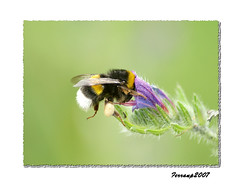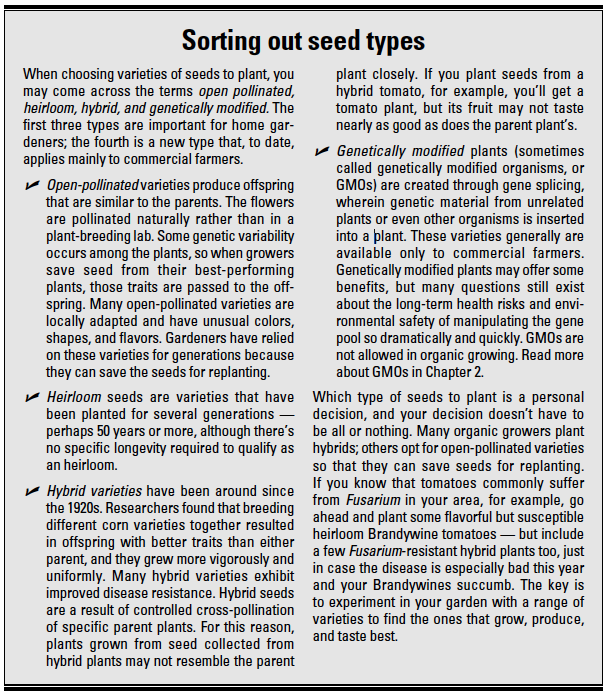 What’s the difference between an heirloom and hybrid tomato?
What’s the difference between an heirloom and hybrid tomato?
Are open-pollinated seeds good or bad?
These are all questions that you have asked me.
You already have reputable sources to buy your seeds.
Here’s a simple explanation of the different types of seeds.
Here’s a simple explanation of the different types of seeds. — Tweet This
Different seed types
To help with the clarification, I asked SeedsNow.com, who sells 100% NON-Genetically engineered seeds – all of which are heirloom/non-hybridized and open-pollinated varieties. Here is what they said:
 Genetically modified seeds
Genetically modified seeds
Genetically modified seeds (GM) have been genetically altered/engineered in a lab somewhere and have had specific changes introduced into their DNA by applying genetic engineering techniques. The interesting thing about GMO seeds is that gardeners are not able to save the seeds after harvest and must buy seed every year from large seed corporations, such as Monsanto.
3 sources to buy your vegetable seeds
Heirloom seeds
They are typically open to debate, but some would argue that any seed that has been passed down for generations, usually for 50+ years, is called an heirloom seed. Heirloom seeds are also non-hybrid and open-pollinated.
Hybrid seeds
When someone talks about a hybrid seed variety it typically means the seed has been cross-bred with another variety to try and enhance its results. For example, one might try and cross breed it with another variety that has disease resistance. The problem with hybrid seeds is that when a gardener tries to save the seeds from that variety it typically reverts back to its wild parent and will never really know what will grow.
Non-hybrid seeds
On the other hand, non-hybrid seeds have not been ‘crossed’ with any other strain. Non-Hybrid seeds are the most natural and purest form of seed anyone can find. Anyone can save the seeds after each harvest and be assured they will grow the same every time.
Open-pollinated seeds
Means the plants are pollinated by insects, bees, birds, wind, and other natural ways. The good thing with open-pollinated plants is that it will continue to reproduce new generations of those plants.
Your turn
Help spread the knowledge by sharing this post with friends and family. Then in the comments below, let me know what kind of seeds you have started.





















I haven’t started growing anything yet, but I planted a few pepper seeds in starter pots. I have a relatively small place to plant, and I am looking for someone who wants to trade seeds to get more of a variety.
So far…Snow Peas, Pole beans, Butter Lettuce, Watermelon Radish, Rainbow Mix Carrots Arugula and my sorel is huge it re-seeded itself this year along with a ton of cool season veggies popping up all over. Yaay for spring and Non-Hybrids!!
I’m sure you can find some people in your area…Google it.
That’s what’s up!
Cool Mike – I’ve been trying to understand these differences because I saved some seeds but realized that the plant was hybrid. I’ve read that saving seeds from hybrid vegetable is not recommended because the vegetable grown from the seed may not be like the parent strain. I also read that hybrid seeds may not germinate (which is what happened to ichiban seeds I saved). I’m not sure why hybrid seeds would be sterile…I wonder if it like a mule…I’m also wondering in nature, aren’t plants more likely to be hybrid? Since insect roam all over the place so there is higher chance of cross-pollination?
That’s a good question of which I’m not sure the answer. Lemme see if I can get someone to chime in to help answer that.
Here is the response that I got from Chris of SeedsNow.com ,”The problem with saving seeds from Hybrid varieties is that they will revert back to the parent strain. In order to get the same results of the hybrid variety a grower will likely need to repurchase the seeds from the place they originally purchased them from.
Essentially, you can save Hybrid seeds and grow them but they won’t produce the same plant that you think you’re growing. It just won’ work that way. So if you save the hybrid seeds and grow them the following year in hopes they’ll be “disease resistant”, you may be mistaken.”
we just keep our seeds from our veggies and fruits, dry them and plant them, and they are pollinated by bees, or so I’ve seen… so I guess we have non-hybrid, open-pollinated seeds : )
That works.
My very limited understanding would be that while the seeds may be viable and germinate, as you’ve stated a bit differently above, they won’t grow “true to seed.” You won’t know what you’re getting. I am doing a trial (not a terribly scientific one) of 15 varieties of tomatoes here in Coastal NC, where heirloom varieties succumb to disease before producing a decent crop. I am unwilling to sacrifice taste, however. Since ALL the varieties I’m growing have disease resistance and most advertise being able to set fruit over 95 degrees, and all will be open pollenated in my garden, who knows, maybe I’ll come up with a good tasting disease resistant tomato of my own? Say by the 3rd year, if I only select seeds from those plants that showed disease resistance…
Does GMO plants need to be pollinated?
My seeds I ordered say ….Non GMO,NON hybrid,Heirloom Organic.How do I really know I’m getting that? Is there a place I can order from, and know that I’m getting the Real Deal! Help anyone!